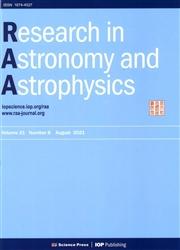EP Aquarii: A New Picture of the Circumstellar Envelope
IF 2.8
4区 物理与天体物理
Q3 ASTRONOMY & ASTROPHYSICS
引用次数: 0
Abstract
New analyses of earlier ALMA observations of oxygen-rich AGB star EP Aquarii are presented, which complete a previously published analysis and offer a different interpretation of the morpho-kinematics of the circumstellar envelope. The birth of the equatorial density enhancement (EDE) is shown to occur very close to the star where evidence for rotation has been obtained. Close to the star and where outflows have been observed: their interaction with the gas of the nascent EDE is seen to play an important role in the development of the wind and the evolution of its radial velocity from 8 to 10 km s−1 on the polar symmetry axis to ∼2 km s−1 at the equator. It implies complex morpho-kinematics: making reliable interpretations with reasonable confidence is difficult. In particular, it questions an earlier interpretation implying the presence of a white dwarf companion orbiting the star at an angular distance of ∼0.″4 from its center. It proposes instead an interpretation in terms of a standard mass ejection associated with a shock wave leaving a void of emission in its wake. High Doppler velocity wings are seen to consist of two components, the upper velocity end of the global wind, reaching above ±12 km s−1, and an effective line broadening, confined within 200 mas from the center of the star, reaching above ±20 km s−1 and interpreted as caused by the pattern of shock waves resulting from the interaction between stellar pulsation and convective cell partition.水瓶座 EP:恒星环包的新图景
本文介绍了对富氧 AGB 星 EP Aquarii 早期 ALMA 观测结果的新分析,这些分析完成了之前发表的分析,并对星周外包层的形态运动学提供了不同的解释。研究表明,赤道密度增强(EDE)的产生非常靠近恒星,在恒星附近已经获得了旋转的证据。在恒星附近和观测到外流的地方:它们与新生 EDE 气体的相互作用被认为在风的发展及其径向速度从极对称轴上的 8 到 10 km s-1 演变到赤道上的∼2 km s-1 的过程中发挥了重要作用。这意味着复杂的形态运动学:很难做出具有合理可信度的可靠解释。特别是,它对早先的一种解释提出了质疑,这种解释意味着存在一个白矮星伴星,它围绕恒星运行,与恒星中心的角距离为∼0.″4。它提出的解释是,标准的质量抛射与冲击波有关,在其后留下了发射空隙。高多普勒速度翼由两部分组成,一部分是全球风的上端速度,达到±12 km s-1以上;另一部分是有效的线增宽,局限在恒星中心200mas的范围内,达到±20 km s-1以上,被解释为由恒星脉动和对流单元分区相互作用产生的冲击波模式引起的。
本文章由计算机程序翻译,如有差异,请以英文原文为准。
求助全文
约1分钟内获得全文
求助全文
来源期刊

Research in Astronomy and Astrophysics
地学天文-天文与天体物理
CiteScore
3.20
自引率
16.70%
发文量
2599
审稿时长
6.0 months
期刊介绍:
Research in Astronomy and Astrophysics (RAA) is an international journal publishing original research papers and reviews across all branches of astronomy and astrophysics, with a particular interest in the following topics:
-large-scale structure of universe formation and evolution of galaxies-
high-energy and cataclysmic processes in astrophysics-
formation and evolution of stars-
astrogeodynamics-
solar magnetic activity and heliogeospace environments-
dynamics of celestial bodies in the solar system and artificial bodies-
space observation and exploration-
new astronomical techniques and methods
 求助内容:
求助内容: 应助结果提醒方式:
应助结果提醒方式:


